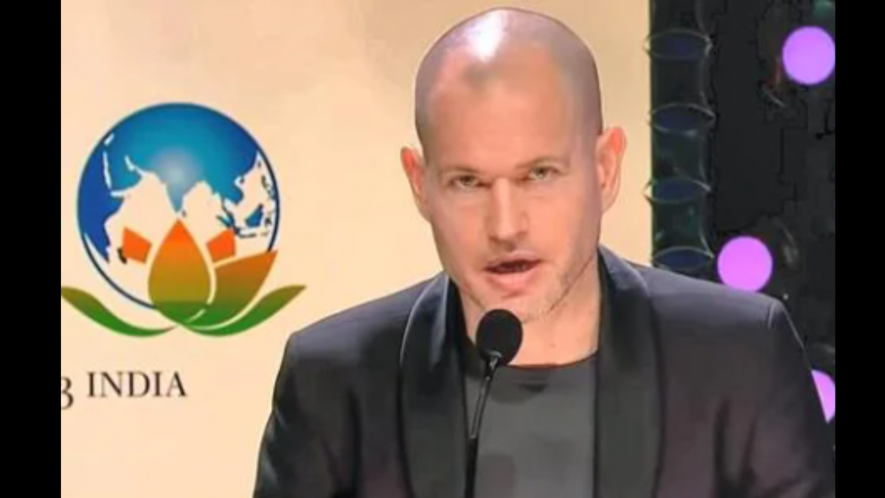Nadav Lapid is Right: Kashmir Files is Propaganda

Israeli filmmaker and IFFI jury head Nadav Lapid speaks during the closing of the 53rd International Film Festival of India (IFFI), in Goa. Image Courtesy:PTI
In his closing remarks at the 53rd International Film Festival of India in Goa, Nadav Lapid, who headed the jury for the international competition section, announced that 14 of the 15 films before the jury evoked vivid discussions. But the last one left the jury disturbed and shocked. He was referring to The Kashmir Files, which he said felt to the jury like a “vulgar propaganda” film. “I feel totally comfortable to share these feelings with you on stage. We can truly accept a critical discussion also, which is essential for art and for life,” said Lapid, a highly regarded filmmaker.
Lapid said his panel did not consider Vivek Agnihotri’s film worthy of participating in an artistic competition. He made it clear the jury’s opinion about the film was unanimous, though the sole Indian on the panel, Sudipto Sen, later said making public the jury’s private discussions hurt his feelings. Sen ascribed the views Lapid expressed to him alone, though no other jury member has challenged the Israeli filmmaker.
Hell Breaks Loose
Lapid’s words were bound to stir up India, especially since IFFI is organised by the Indian government, whose top political brass aggressively endorsed The Kashmir Files and ensured it became a commercial success. The right-wing is also shocked by Lapid because they consider the Israeli government a close ally. As if to prove them correct, Israeli ambassador Naor Gilon demanded Lapid apologise for “damaging” Israel’s ties with India.
Gilon said he felt ashamed and apologised for how “we [Israelis] repaid them [India] for their generosity and friendship”. He lamented that Lapid’s statements have brought on the representatives of Israel in India presumably angry messages from those who disagree with Lapid’s views. As an envoy, Naor can easily complain about any abusive or threatening messages he may be getting. So, it is perplexing why he is lashing out at the jury head of a film festival.
Dissecting ‘Vulgar Propaganda’
The Kashmir Files director Vivek Agnihotri has also claimed that if Lapid proved the events depicted in the movie as fabricated, he would quit the profession. But Lapid, in an interview with an Israeli daily, has already explained the film is problematic because it “justifies the Indian policy in Kashmir, and has fascist features”.
Agnihotri has based his film on Kashmiri Pandits who were forced to leave the valley when militancy broke out in the 1990s. He claims to have interviewed around 300 displaced Kashmiri Pandits and portrayed their truth in his film. But the question arises, why did he focus only on Kashmiri Pandits when he tackled the horrors of those years? Militancy affected every Kashmiri in the nineties, including the thousands of Muslims killed and displaced. The very first prey of militants was National Conference leader Mohammad Yusuf Halwai. Militants killed many prominent Kashmiri Muslims, such as eighty-year-old Maulana Madoodi, apart from scores of ordinary Muslims. None are mentioned in the film.
Even the ‘truth’ of the film, as it relates to the Pandit community, is blinkered. For this reason, many—not just Lapid—have challenged its narrative due to hyperbole, falsehood and half-truths in presenting the Kashmir conflict and the Pandits. Exaggerations continue to emerge, as in Kashmiri Pandit filmmaker Ashoke Pandit’s claim that three lakh Kashmiri Pandits were killed during the 1990s. That is more than the total number of Kashmiri Pandits who migrated in the 1990s! Official data put the death toll of the Pandits at about 319, while the resident Pandit organisation, Kashmiri Pandit Sangharsh Samiti, has claimed 650 such killings. Even the Kashmiri Pandit organisation Panun Kashmir never claimed a number beyond 3,000.
Overstatements and exaggerations don’t become true, even if one who belongs to a victimised community makes them. And the flip side is equally relevant. Would any of those who inflate the death toll of the Valley’s Pandits care to remember Parzania, a film based on accounts of the Gujarat riot victims? Well, the BJP government of Gujarat had it banned.
Agnihotri’s one-sided portrayal promoted the divisive right-wing agenda through the cultural domain. While I was working on my book, Kashmir Aur Kashmiri Pandit, many members of the community described experiences and feelings that find no space at all in his movie. Is it because their views ran against racist and communitarian propaganda? Enough Kashmiri Pandits have acknowledged the assistance their Muslim friends and neighbours provided them during the tumultuous nineties. Many Pandits say they handed over the keys to their homes to neighbours as they left the valley, and that neither side imagined they would never be able to return. Enough Kashmiri Pandits have written about their violence and migration in less disagreeable terms.
However, the film picks events that portray all Kashmiri Muslims as conspiring against the minority Pandits. It creates the impression that every Pandit is a victim and every Muslim has conspiraced against them. Such a plot informs the grand narrative of The Kashmir Files, and though it is far from the truth, the right holds it dear, for it suits their political agenda. Recall that the outrage expressed within and outside theatres during the screening of this film sparked communal incidents. That is how it was instrumentalised to polarise people as Assembly elections in various states lay ahead. Those arguments, skirmishes and fights the film sparked, quite likely, is what Lapid meant by the “fascist feature” of The Kashmir Files.
Not all Kashmiri Pandits left the valley on a single date. They went over time, and many stayed on, including the roughly 5,000 still in the valley. Their organisation, the KPSS, severely criticised Agnihotri’s film and listed it among the reasons for the recent killings of Pandits in the valley.
The Kashmir Files is not just a random collection of events but a political project that backs the ruling dispensation. It implicates the Rajiv Gandhi-led Congress government and portrays Farooq Abdullah as a facilitator of militants. But it is mum on then governor Jagmohan, and does not nod to the fact that Kashmiri Pandits left during his term, when the VP Singh government supported by the Bharatiya Janata Party was in power. The BJP picked Jagmohan for the governorship against the wishes of Abdullaah, who resigned soon after the decision.
Anybody oblivious to this recent history of Kashmir will emerge after watching this movie with the impression that the Kashmir problem is essentially religious and the displacement of Kashmiri Pandits occurred when Gandhi and Abdullah held power, Not just that, they may be convinced that these two connived for that eventuality. The movie extends the fraudulent history that the right is propagating across the country.
Perpetual Right-wing Outrage
The criticism of Lapid’s statement soon took on a nationalistic flavour when panellists on pro-government media outlets tried to portray his views as a critique of India. Ambassador Gilan’s statement suggest his remarks would hurt India’s relations with Israel. Since Lapid limited his remarks to the film, it is intriguing why we must drag two countries into the discussion. Does this not indicate that the film means more to the right than any other movie? That it has a political agenda supported by the government?
India has recently changed its position on Israel, to which Israel has been more than receptive. Earlier, India was a strong votary of the Palestinian cause, and Israel was not a diplomatic favourite. The new relationship between them is more ideological than strategic. As such, Lapid’s statement creates discomfort for the ruling regimes of both countries. However, Lapid has also criticised Israel’s stand on Palestine, which reflects in his films. And he is no lightweight in cinema. His debut film, Policeman, won the Special Jury Prize at the Locarno International Film Festival in 2011. His 2014 film, The Kindergarten Teacher, featured in the 2014 International Critics’ Week. Lapid was on a jury at the 2016 Cannes Film Festival. He received the prestigious Ordre des Arts et des Lettres. In February 2019, his film Synonyms won the Golden Bear at the 69th Berlin International Film Festival.
Lapid did not change his views after reaching Israel. He highlighted the dangers of fascism and how it uses cinema in the interview to the local outlet. He said he would not be surprised if Israel produces a film on the lines of The Kashmir Files soon.
It reminds me of the Ministry of Propaganda established in Hitler’s Germany, which used radio and cinema to contaminate people’s minds with hate and violence for the Jews and the tactics Israel has deployed against the Palestinians. Lapid is a conscience-keeper of society and has raised his voice for justice and peace in a time of hatred and violence.
Ashok Kumar Pandey is the author of several books and a political commentator. The views are personal.
Get the latest reports & analysis with people's perspective on Protests, movements & deep analytical videos, discussions of the current affairs in your Telegram app. Subscribe to NewsClick's Telegram channel & get Real-Time updates on stories, as they get published on our website.
























